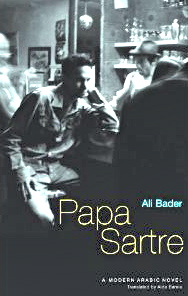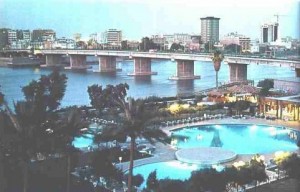Note: This book was WINNER of the State Prize for Literature in Baghdad in 2002, and of the Tunisian Abu-Qassem al-Shabi Award.
“Let’s transform Baghdad into another Paris. Let’s make it a second Paris, the capital of existentialism.”
When a n unnamed speaker is contacted by a gravedigger and his “depraved friend” to write a biography of the recently deceased philosopher Abd al-Rahman, “the existentialist of Baghdad,” he is told that the biography will be financed by a wealthy merchant and that they have documents to give him for his research. Though the writer knows that these people are scoundrels, he is so destitute that he agrees to accept the job. Constantly looking for valuable information which will eliminate the possibility of distortion, the speaker begins his research. Ultimately, one of his financial backers, a trader in art and antiques, tells him just to “present [me] with some endings, and [I] will choose one.”
n unnamed speaker is contacted by a gravedigger and his “depraved friend” to write a biography of the recently deceased philosopher Abd al-Rahman, “the existentialist of Baghdad,” he is told that the biography will be financed by a wealthy merchant and that they have documents to give him for his research. Though the writer knows that these people are scoundrels, he is so destitute that he agrees to accept the job. Constantly looking for valuable information which will eliminate the possibility of distortion, the speaker begins his research. Ultimately, one of his financial backers, a trader in art and antiques, tells him just to “present [me] with some endings, and [I] will choose one.”
Part II, “The Writing Journey,” consists of biographical snippets by the writer/biographer, though the presentation of information is not chronological. Flashing back to the life of Abd al-Rahman in the 1960s, the story unfolds, a challenging story in which the philosophy of Sartre becomes irrevocably intertwined with the pleasure-seeking de sires of the well-off Abd-al-Rahman, who is always seeking the goal of “nausea” through wine, women, and self-indulgence. Whenever he is invited to write an article for publication, he turns it down with the excuse that “Whoever writes finds something worthwhile, a meaningful life. How can I then go on believing in a meaningless world?” They believe in constant talk, not writing – conveniently rationalizing their behavior in terms of their search for “nausea.”
sires of the well-off Abd-al-Rahman, who is always seeking the goal of “nausea” through wine, women, and self-indulgence. Whenever he is invited to write an article for publication, he turns it down with the excuse that “Whoever writes finds something worthwhile, a meaningful life. How can I then go on believing in a meaningless world?” They believe in constant talk, not writing – conveniently rationalizing their behavior in terms of their search for “nausea.”
As the intellectual pretentions of Abd al-Rahman and his friends become more and more obvious to the reader, the satire becomes more pointed, and as Abd al-Rahman’s family wealth begins to decline, he does not care, or change his way of life. The nature of his death is a mystery – did he shoot himself as an existential act, or was he shot by someone with more mundane reasons for his death? “He liked depravity, which he felt was close to his soul.” As the writer reveals more and more information about Abd al-Rahman’s life (and then re-enters the story in the final few pages), the action and the surprises increase.

Baghdad in older, more affluent times
Iraqi author Ali Bader, now living in Belgium, has written a novel which is fascinating for the glimpses it offers of the cultural life of Baghdad in the 1960s, even though some aspects of this life are satirized for their pretentions. The contrast between Sartre’s true despair and hopelessness (leading to his feeling of “nausea”) and the hedonism with which Abd al-Rahman tries to achieve “nausea,” which he usually looks for in alcohol and sex, is dramatic. And when Sartre finds the reality of existence in objects and begins to relate that to his “nausea,” we see the ultimate absurdity – Abd al-Rahman finding significance in a mundane piece of food. Winner of many prizes and author of nine novels, Ali Bader has been described as one of the Arab world’s most significant authors.
ALSO by Ali Bader: THE TOBACCO SHOP
Photos, in order: The author’s photo appears on http://penatlas.org
Baghdad in older, more affluent times: http://www.asiagroup.eu/
